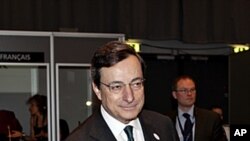European ministers meeting in Copenhagen have agreed to create a permanent fund for the eurozone to help it recover from its debt crisis with temporary lending capacity of more than $1 trillion. The eurozone nations are working to ensure that the economic crisis does not spill over into Spain and Italy.
It is the most recent step taken by Europe to show the markets that they can cope with the economic crisis hitting a number of its member states.
The decision means that a financial rescue fund (firewall) worth around $1 trillion will be available for future loans.
In a statement, the group of 17 finance ministers said that finally “robust firewalls have been been established.”
Earlier in the day, European Union Economics Minister Olli Rehn said Europe has made a lot of progress towards safeguarding its economies. "We have made significant progress in the recent weeks and months in terms of fiscal consolidation and in terms of reinforcing our economic governance," he said. "Now it is time to complete the crisis response by further reinforcement of the euro area financial firewall."
But going into the talks, there was some controversy about the size of the emergency fund.
The eurozone’s largest economy, Germany, has been averse to raising the bar so high. France, on the other hand, has been more forthcoming.
French Finance Minister Francois Baroin said the higher the firewall, the greater the deterrence against instability in the markets.
What Europe’s ministers ended with was a hike -- but analysts say it may not be enough to calm the markets.
Earlier this week, the Organization for Economic Cooperation and Development said the bailout fund should be raised to $1.3 trillion -- more than Friday’s agreed sum. The fund was previously worth around $650 billion.
The new figure was partly reached by combining money already pledged into one fund.
Austrian Finance Minister Maria Fekter told reporters that the eurozone is now much stronger than it was a few months ago.
Simon Tilford is chief economist at the Center for European Reform, a London-based research group that campaigns for European integration.
He says Europe’s reaction to its economic crisis is not working. What is needed, he says, is a federalized system where resources cross borders more freely.
"I think what needs to happen is that the governments need to accept that a currency union requires a much closer degree of integration than they have been hitherto prepared to acknowledge. So they need some kind of federal budget -- the kind of federal budget that effectively transfers funds between the states of the U.S., for example." said Tilford.
Spain’s government is set to reveal a new 2012 budget Friday that is expected to make billions of dollars in cuts.
On Thursday, workers went on strike across Spain to protest the cuts, high unemployment rates and new labor laws.
The Spanish government insists it will not need to be bailed out by its euro neighbors. Speaking in Copenhagen Friday, Spain’s economy minister said the new Spanish budget will convince euro leaders and the markets that Spain can cope with its debts and create growth in the Spanish economy.




